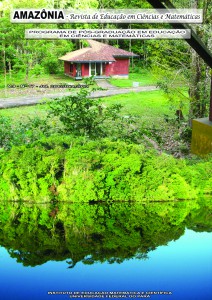The establishment of a socio-scientific issue in a group of teachers: a polyphonic process of unveiling the concrete reality
DOI:
https://doi.org/10.18542/amazrecm.v9i17.1644Keywords:
socio-scientific issues, formation of the subject, teachers groupAbstract
This article presents part of a broader research an d seeks to elucidate the process of setting up a Socio-scientific Issue in a group of teachers at a public school. Assuming that a Socio-scientific Issue must aggregate those involved in the educational process in situations of dialogue, argumentation and construction of a positioning, we understand that the recognition of the controversy or of the legitimacy of the theme in the context at stake is crucial to achieving the desired goals. Thus, starting from subsidies from the Critical Theory of Society, we characterize the process of setting up a Socio-scientific Issue among teachers as an exercise of unveiling the concrete reality, listing problematic, controversial and open to criticism aspects of Science and Technology. Thus, the Socio-scientific Issue is listed out in the group as soon as it is established a polyphonic dialogue where all participants stand, recognize the fertility of the theme for the intended educational context and can speak of it with proprietyReferences
ADORNO, T. W. Notas Marginais sobre Teoria e Práxis. A Dialéctica do Esclarecimento e outros textos de Theodor W. Adorno, 2001. Disponivel em: http://adorno.planetaclix.pt/tadorno1.htm> . Acesso em: 02 Junho 2012.
ADORNO, T. W.; HORKHEIMER, M. Dialética do esclarecimento. Tradução de Guido Antônio de Almeida. Rio de Janeiro: Jorge Zahar Editor, 1985.
BARDIN, L. Análise de Conteúdo. Tradução de Luís Antero Reto e Augusto Pinheiro. 4ª. ed. Lisboa: Edições 70, 2009.
BOGDAN, R. C.; BIKLEN, S. K. Investigação qualitativa em Educação: uma introdução à teoria e aos métodos. Porto: Porto Editora, 1994. Coleção Ciências da Educação.
BRASIL. Lei nº 9.394, de 20 de dezembro de 1996. Lei de Diretrizes e Bases da Educação Nacional, Brasília, 20 Dezembro 1996. Disponivel em: http://www.planalto.gov.br/ccivil_03/Leis/L9394.htm>. Acesso em: 04 Setembro 2012.
BRASIL. Parâmetro Curriculares Nacionais: Ensino Médio. Brasília: SEB/MEC, 2000.
BRASIL. Orientações Educacionais Complementares aos Parâmetros Curriculares Nacionais. Brasília: SEB/MEC, 2002.
DÉSAUTELS, J.; LARROCHELLE, M.About the epistemological posture of science teachers. In: TIBERGHIEN, A.; JOSSEM, E. L.; BAROJAS, J. Connecting research in physics education with teacher education. [S.l.]: International Commission on Physics Education, 1997,1998.
EASTWOOD, J. L. et al. Contextualizing Nature of Science Instruction in Socioscientific Issues. InternationalJournalof Science Education, 2012. 1-27.
GALVÃO, C.; REIS, P.; FREIRE, S. A discussão de controvérsias sociocientíficas na formação de professores. Ciência&Educação, Bauru, 17, n. 3, 2011. 505-522.
GRAY, D. S.; BRYCE, T. Socio-scientific issues in science education: implications for the professional development of teachers. Cambridge JournalofEducation, Londres, 36, n. 2, Junho 2006. 171-192.
GUIMARÃES, M. A. Raciocínio informal e a discussão de questões sociocientíficas: o exemplo das células-tronco humanas. Faculdade de Ciências - UNESP. Bauru, p. 220. 2011. Tese de Doutoramento.
HILÁRIO, T.; REIS, P. G. R. Potencialidades e limitações de sessões de discussão de controvérsias sociocientíficas como contributo para a literacia científica. REU, Sorocaba, v. 35, n. 2, p. 167-183, Dezembro 2009
HODSON, D. Toward a philosophically more valid science curriculum. Science Education, 72, n. 1, 1988.19-40.
HODSON, D. Looking to the future: building a curriculum for social activism. Rotterdam: Sense Publishers, 2011.
KHISHFE, R. Nature of Science and Decision-Making. International Journal of Science Education, 34, n. 1, 2012.67-100.
LOPES, N. C. Aspectos formativos da experiência com questões sociocientíficas no ensino de ciências sob uma perspectiva crítica. Faculdade de Ciências de Bauru - UNESP. Bauru, p. 230. 2010. Dissertação de Mestrado.
MAAR, W. L. Adorno, Semiformação e Educação. Educação e Sociedade, Campinas, 24, n. 83, Agosto 2003. 459-476.
PEDRETTI, E. G. et al. Promoting Issues-based STSE Perspectives in Science Teacher Education: Problems of Identity and Ideology. Science &Education, 17, n. 8-9, 2008. 941-960.
PUCCI, B. Teoria Crítica e Educação. In: PUCCI, B. Teoria Crítica e Educação: A questão da formação cultural na Escola de Frankfurt. Petrópolis, RJ; São Carlos, SP: Vozes; EDUFISCAR, 1994. Ciências sociais da educação.
RATCLIFFE, M.; GRACE, M. Science Education for the citizenship: Teaching socio-scientific issues. Philadelphia: Open University Press, 2003.
REIS, P. G. R. Controvérsias sócio-científicas: discutir ou não discutir? Percursos da aprendizagem da disciplina de ciências da Terra e da Vida. Faculdade de Ciências da Universidade de Lisboa. Lisboa, p. 488. 2004. Tese de Doutoramento.
SANTOS, P.G.F. O tratamento de Questões Sociocientíficas em um grupo de professores e a natureza do processo formativo fundamentado em uma perspectiva crítica. Faculdade de Ciências de Bauru - UNESP. Bauru, p. 209, 2013. Dissertação de Mestrado
ZEIDLER, D. L.; KEEFER, M. The role of moral reasoning and the status of socioscientific issues in science education: phylosophical, psychological and pedagogical consideration. In: ZEIDLER, D. L. The role of moral reasoning on socioscientific issues and discourse in science education.Dordrecht: KluwerAcademicPublishers, 2003. p. 7-38.



